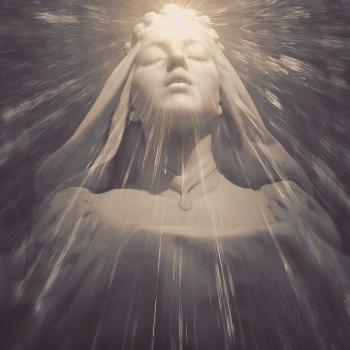This is the final piece in a series of five essays on the topic of Evil.

(A) Introduction
It would be hard to overestimate the importance of “Satan” in the story of human evolution; not that God/Source creates evil or even “approves” of it, but rather, allows it as a necessary element of the development of freewill (the ability to do as pleases me) and of freedom (the ability to do as pleases God.) Evil is necessary in the move from service-to-self into service-to-others; in the move from narcissism to compassion.
Here’s what I mean by evil. It is the energy that is born and nurtured when beings, who have free will, continually make choices for selfishness. Over time this energy swells into a dark force which influences the journeys of all other souls. To the extent that any soul “marinates” in that energy, violence follows.
I believe that, as souls, we make “pre-conception contracts” that involve volunteering to incarnate in an environment in which we will contend with the reality of “evil beings” and “evil energies.” It is how the soul grows. This in NOT to justify or applaud evil, but to acknowledge that it is part of the equation that we voluntarily embrace in order to grow. As Rumi said, “Out beyond right doing and beyond wrong doing, there is a field; I will meet you there.”
Why would you volunteer to live in a universe which is subject to gravity, and in which you could have a building collapse on you and kill you? Why agree to life on a planet that has earthquakes, tornadoes and tsunamis? Why agree to a body which is inevitably going to get sick, age and die?
We choose all of these limitations, not because gravity, earthquakes and illness are good or bad, but because they help us to learn how to love. Whoever or whatever Satan is, we are meant to work with that reality in order to grow spiritually.
Imagine a spectrum with utter darkness at one end and brilliant light at the other. The archetypes of Satan and Christ are, perhaps, the bookends. Each thought, word and action moves us along that spectrum – towards the light or towards the dark. It affords us both the daily invitation to live consciously, and the instant feedback on what effect our living is having.
(B) Interlude
Temptation, then, is not the awful invitation to evil but, rather, the life tool that allows one to hone the faculty of discernment, to learn how to choose love and light over greed and shadow.
And each of the great avatars wrestled with temptation. Archetypically, it came to a head when they were about to begin their public ministries. In this article, I’ll use the accounts of Jesus’ temptation in the wilderness, Hindu theory, and the life of the Buddha, to illustrate the three categories of temptation that we must confront, if we are serious about the spiritual journey.
(C) The First Temptation – Food
For young souls, says Hinduism, the first temptation is sensual delight. This results from identifying with the body and mistaking physical pleasure for happiness. It points out that sensuality, per se, is fine as long as it is accompanied by moral behavior. But eventually, Hinduism teaches, the soul yearns for a more satisfying experience.
In the modern West, addiction to food, drink, drugs and sex creates a multi-billion dollar industry that pampers our reptilian brain and leads to all kinds of medical, psychological and social problems. At the other end of the economy are countless millions of humans who die of starvation.
So, while one group is tempted to overindulge, the avatars are expected to miraculously solve the world’s food “shortage” with dramatic displays of power. The Buddha, when tempted by Mara, “if you really are enlightened, turn the Himalayas, the king of all the mountains, into gold”, replied, “If all the mountains of the world were turned into gold, there would not be enough to satisfy one person’s greed.”
And that was the same temptation that Satan offered Christ, after a 40-days fast, “If you are the Son of God, turn these stones into bread.” He was not just inviting Christ to fill his own slack belly, but to mass-produce food for the world to show his cosmic compassion. Jesus realized that if he were to do so, the “powers that be” would immediately wrest control of the supplies, hoard them and use them as a reward and punishment tool.
This is precisely what happened with the Agricultural Revolution 5,000 years ago. The invention of the ox-drawn plow and of ceramic, waterproof containers allowed humans to mass-produce and store great amounts of food. Then, for the first time, food became a weapon of mass destruction. The enemy’s food supplies could be stolen or destroyed and his fields salted so that nothing could grow there for decades.
Monsanto and their ilk are a modern version of this. They have claimed patents on seeds that took 10,000 years to develop; they have poisoned the land, the air and the water with herbicides and insecticides; and they develop eunuch seeds incapable of producing second-generation crops. In the last decade more than 250,000 Indian farmers have committed suicide in hopelessness at their inability to feed their families and at the government’s collaboration with these multinational vampire corporations.
This is the temptation to which the Buddha, Jesus and Hinduism were all saying, “No!” Feeding the hungry is not about a miracle, it’s about the individual and community invitation and responsibility to love, to care and to share. The temptation is an opportunity to discern what stinks in our economic models, and reinvent new systems based on our shared incarnation. Dom Helder Camara, the archbishop of Recife, Brazil once said, “When I feed the poor, they call me a saint; when I ask why it is that the poor do not have food, they call me a communist.”
(D) The Second Temptation – Power
After many incarnations, with the assistance of karma (a feedback loop of cause-and-consequence), the soul, says Hinduism, begins to realize that simply pampering sensuality does not bring happiness. Modern psychology has come to the same conclusion: while our reptilian brain is excited by pleasure, the mammalian brain (limbic system) is designed to habituate to it. We need more and more to get less and less of a fix. In other words, pleasure must not be confused with happiness.
So, for the next series of incarnations, says Hinduism, the ego will fixate on achieving power, privilege and prestige.
In the Christian story, Jesus is taken to the top of a very high mountain and shown all the kingdoms of the Earth. Satan tells him, “I will give you jurisdiction over all of these, if falling down you will worship me.” On the face of it, this seems like a pretty pathetic proposal. He must have known that Jesus wasn’t into personal power. But the temptation is actually a much subtler one i.e., “You can have control over all the institutions, organizations, kingdoms, empires, militaries, economic systems and their resources; and bend them towards justice and compassion for all.”
It is a temptation that has been gladly accepted, over the last 5,800 years by the elites and oligarchies, from Sumer to Wall Street.
As a naïve child growing up within the infallible Roman Catholic Church, I was convinced that, if only every nation were to install a Catholic bishop as president, there would be immediate and permanent peace on the planet. That was before I read Church history.
Overhauling corrupt systems is necessary but not sufficient. Unless these systems are staffed by persons who are themselves committed to individual holiness, then the water (people) flowing through the pipes (systems) will simply corrode the pipes. Christ would famously say, “New wine (transformed individuals), new wineskins (transformed systems).”
You can’t legislate or force people into loving behavior. So, reluctantly, in response to Satan’s second temptation, Christ said, “Thanks, but no thanks!”
(E) The Third Temptation – Religion
According to Hinduism, during the third series of incarnations, we are subject to the temptation of “service.” But this is still far short of Moksha (liberation), the realization that the sense of separate self (upon which service-to-other is predicated) is the final illusion on the road to enlightenment. There is no separate self; and both the Buddha’s teaching – Anatma – and Confucius’ contention that the self is an illusion created by the sum of our social roles, point in that direction. And this is the great temptation of religion – serving and saving others.
Satan takes Jesus to the pinnacle of the temple in Jerusalem, shows him the crowds milling below and suggests a third alternative, “why don’t you start a brand new religion and kick it off with a REALLY spectacular miracle; why don’t you bungee jump without a bungee cord, since it is written in Psalm 91, ‘he has given his angels charge over you, lest you dash your foot against a stone.’ Alert the crowd below, then jump, land safely, begin preaching and start the ‘religion to end all religions!’”
Wouldn’t that change people’s hearts? No, it would merely titillate their need for entertainment, until Monday Night Football was invented.
Although each of the great religions began with a deep mystical impulse on the part of the “original prophet”, inevitably it goes through the following cycle:
Spiritual experience – charismatic prophet – community
– death of prophet – organization – oligarchy – theology – dogma
– crusades against outsiders – inquisitions against insiders
– new prophet.
A famous Indian guru once said that if you come upon the tracks of a religion in the desert, follow them, not where they are leading but, rather, where they have come from.
So, for the third time, Jesus’ response was a resounding, “No!”
Conclusion
How could you possibly develop freewill, freedom or compassion without being tempted? How could you find Moksha unless your faculty of discernment were honed by trial and error? How can you hit the bull’s eye unless you use the feedback of previous arrows to adjust your aim?
Without temptation we would be robots, pre-programmed to be “good.” One who is unconsciously good is simply “lucky”; one who is unconsciously evil is simply “asleep”; one who is consciously evil is pathological; and one who is consciously good is enlightened.
According to the Talmud, Adam and Eve sneaked back into the Garden of Eden one night to taste once more of the forbidden fruit. They heard a rustling in the leaves of the tree and discovered an embarrassed God also feasting on the fruit.
Temptation may well be the royal road to enlightenment.












